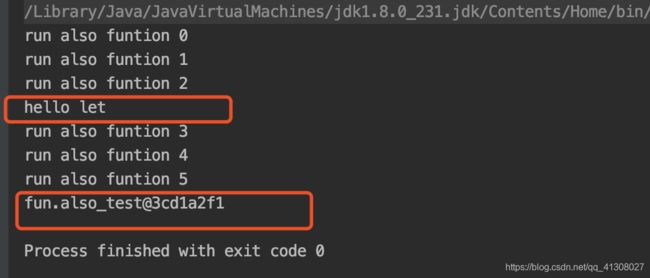解析Kotlin:let ,apply,run,with,also,takeif
let
定义:默认当前这个对象作为闭包的it参数,返回值是函数里面最后一行,或者指定return
源码
/**
* Calls the specified function [block] with `this` value as its argument and returns its result.
*
* For detailed usage information see the documentation for [scope functions](https://kotlinlang.org/docs/reference/scope-functions.html#let).
*/
@kotlin.internal.InlineOnly
public inline fun <T, R> T.let(block: (T) -> R): R {
contract {
callsInPlace(block, InvocationKind.EXACTLY_ONCE)
}
return block(this)
}
使用: 判断对象是否为空,使代码看起来更加优美
package `fun`
class test {
var count: Int = 0
fun funtion() {
println("run funtion $count")
count++
}
}
fun main(args:Array<String>) {
// 不使用 let 判空
val tmp = test()
if (tmp != null) {
tmp?.funtion()
tmp?.funtion()
tmp?.funtion()
}
// 使用let
tmp.let {
it.funtion()
it.funtion()
it.funtion()
}
}
also
类似let函数,但区别在于返回值:
let函数:返回值 = 最后一行 / return的表达式
also函数:返回值 = 传入的对象的本身
源码
/**
* Calls the specified function [block] with `this` value as its argument and returns `this` value.
*
* For detailed usage information see the documentation for [scope functions](https://kotlinlang.org/docs/reference/scope-functions.html#also).
*/
@kotlin.internal.InlineOnly
@SinceKotlin("1.1")
public inline fun <T> T.also(block: (T) -> Unit): T {
contract {
callsInPlace(block, InvocationKind.EXACTLY_ONCE)
}
block(this)
return this
}
- 使用
package `fun`
class also_test {
var count: Int = 0
fun funtion() {
println("run also funtion $count")
count++
}
}
fun main(args:Array<String>) {
val tmp = also_test()
// 使用let
val result_let = tmp.let {
it.funtion()
it.funtion()
it.funtion()
"hello let"
}
println(result_let)
// 使用also
val result_also = tmp.also {
it.funtion()
it.funtion()
it.funtion()
"hello also"
}
println(result_also)
}
apply
与run函数类似,但区别在于返回值:
run函数返回最后一行的值 / 表达式
T.() : 代表自身的对象来调用它
(T) : 某一个对象的调用
源码
/**
* Calls the specified function [block] with `this` value as its receiver and returns `this` value.
*
* For detailed usage information see the documentation for [scope functions](https://kotlinlang.org/docs/reference/scope-functions.html#apply).
*/
@kotlin.internal.InlineOnly
public inline fun <T> T.apply(block: T.() -> Unit): T {
contract {
callsInPlace(block, InvocationKind.EXACTLY_ONCE)
}
block()
return this
}
使用
// 改写apply函数
public inline fun <T> T.apply1(block: T.() -> Unit): T {
return this
}
public inline fun <T> T.apply2(block: (T) -> Unit): T {
return this
}
anyObject.apply1 { // this: MutableListwith
调用同一个对象的多个方法 / 属性时,可以省去对象名重复,直接调用方法名 / 属性即可
源码
/**
* Calls the specified function [block] with the given [receiver] as its receiver and returns its result.
*
* For detailed usage information see the documentation for [scope functions](https://kotlinlang.org/docs/reference/scope-functions.html#with).
*/
@kotlin.internal.InlineOnly
public inline fun <T, R> with(receiver: T, block: T.() -> R): R {
contract {
callsInPlace(block, InvocationKind.EXACTLY_ONCE)
}
return receiver.block()
}
使用:需要调用同一个对象的多个方法 / 属性
with(object){
// ...
}
// 返回值 = 函数块的最后一行 / return表达式
run
结合了let、with两个函数的作用,即:
调用同一个对象的多个方法 / 属性时,可以省去对象名重复,直接调用方法名 / 属性即可
定义一个变量在特定作用域内
统一做判空处理
源码
/**
* Calls the specified function [block] and returns its result.
*
* For detailed usage information see the documentation for [scope functions](https://kotlinlang.org/docs/reference/scope-functions.html#run).
*/
@kotlin.internal.InlineOnly
public inline fun <R> run(block: () -> R): R {
contract {
callsInPlace(block, InvocationKind.EXACTLY_ONCE)
}
return block()
}
使用:
object.run{
// ...
}
// 返回值 = 函数块的最后一行 / return表达式
takeif
源码
/**
* Returns `this` value if it satisfies the given [predicate] or `null`, if it doesn't.
*/
@kotlin.internal.InlineOnly
@SinceKotlin("1.1")
public inline fun <T> T.takeIf(predicate: (T) -> Boolean): T? {
contract {
callsInPlace(predicate, InvocationKind.EXACTLY_ONCE)
}
return if (predicate(this)) this else null
}
从源码可以看出来:它是从T对象本身调用的。即T.takeIf,
predicate函数以T对象为参数
等待predicate评估后它返回this或null
